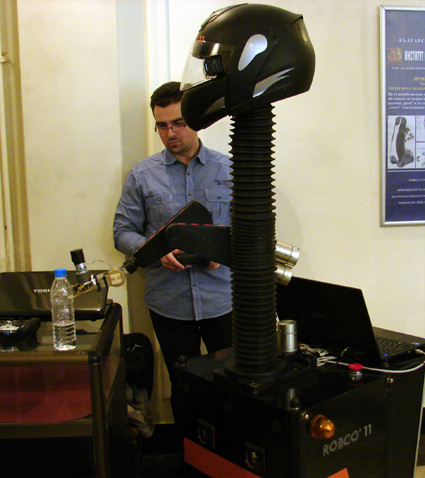Robots, recognizing voice commands and completing different tasks… Those used to be science fiction characters till recently, but now they are turning into reality. Scientists foresee that they will enter our homes within the next 15 years and will become our assistants. Researchers from all over the world, including Bulgaria have taken over the development of Artificial Intelligence. The Institute of Systems Engineering and Robotics with the BAS has marked serious achievements in that direction. Its representatives have developed a family of robots – Robko 11, Robko 12, as well as a new mobile robo-platform. The funding comes under and European project of the Seventh Framework Programme.
 “We can take a step forward in industry with the help of these robots and to help in areas with poisonous chemicals or radioactive contamination,” Chair of the Institute Academician Chavdar Rumenin explains for RB. “Besides that, a robot can find its place in the area of national security either, or can assist humans – the so-called service robots. We have such a project, named Technologies for Independent Life and Social Inclusion, funded under the Human Resources Development OP. The goal is to help elderly or disabled people, socializing them in a more natural way and making their life fuller.”
“We can take a step forward in industry with the help of these robots and to help in areas with poisonous chemicals or radioactive contamination,” Chair of the Institute Academician Chavdar Rumenin explains for RB. “Besides that, a robot can find its place in the area of national security either, or can assist humans – the so-called service robots. We have such a project, named Technologies for Independent Life and Social Inclusion, funded under the Human Resources Development OP. The goal is to help elderly or disabled people, socializing them in a more natural way and making their life fuller.”
The initial price of such a robot is expected to be equal to the one of a car. “However, its mass production will result in the dropping of that price, so it will be able to enter the house of everyone in need,” Associate Prof. Nayden Shivarov, one of the scientists involved in the developing of the robot series, claims, adding that:
“They will live with such people 24/7 and will assist through all that time. The robots will be able to fetch food, water, connect with the relatives online, or call doctors, social workers etc. In case of emergencies they will get in touch with ER. This will be all due to the software developed that will make them recognize movements and the fulfillment of certain tasks will follow.”
Artificial Intelligence can be programmed according to individual needs. For instance, it can give medicines at certain periods of time. If the person refuses to take the pills, the assistant will phone a relative. The Bulgarian scientists continue working on the robot, as their goal is the total safety of the user. Elderly and disabled users will have the opportunity to opt among different communication and command channels, such as joystick, tablet or simply voice commands and gestures.
The Institute’s scientists are working on many other projects, such as a non-contact electric meter with voice information passed to visually impaired people, a walking mobile robot, a robotized arm etc.
English version: Zhivko Stanchev
The program of the Orthodox Book Week offers meetings with authors, publishers and translators of Orthodox books from the last few years. The event is held until November 10 at the ''St. Procopius of Varna'' Church, with meetings taking place every..
The "Kabiyuk" horse breeding farm in the village of Konyovets is the oldest stud farm in Bulgaria, founded in 1864 by Midhat Pasha, the governor of the vilayet of Ruse, to produce horses for the Turkish army. The farm existed until the Russo-Turkish War..
There is no exact statistic on the number of Bulgarians living abroad, but a report from the Ministry of Foreign Affairs from last year indicates that around 2.8 million Bulgarians are living outside the country . According to the 2021 population census..
Two graduates of the Bulgarian School "Saints Cyril and Methodius" in Jordan presented their achievements at an event at their school "Hadi al Muhammadi"..
1000 participants will take part in the first Burgas Half Marathon, which will take place this Sunday, 24 November. The event will bring together..
Radmila Sekerinska from North Macedonia appointed NATO Deputy Secretary General NATO Secretary General Mark Rutte has appointed Radmila Sekerinska..

+359 2 9336 661
